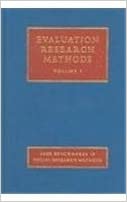Evaluation Research Methods
no information available
Evaluation is a set of research methods and associated methodologies with a distinctive purpose They provide a means tjudge actions and activities in terms of values, criteria and standards At the same time evaluation is alsa practice that seeks tenhance effectiveness in the public sphere and policy making In order timprove as well as judge, there is a need texplain what happens and would have tbe done differently for different outcomes tbe achieved It is in this explanatory mode that evaluation overlaps most directly with mainstream social science This collection offers a complete guide tevaluations research methods It is organized in four volumes Volume 1 focuses on foundation issues and includes sections on the rationale for evaluation, central methodological debates, the role of theory and applying values, criteria and standards Volume 2 examines explaining through evaluation and covers sections on experimentation and causal inference, outcomes and inputs, socio-economic indicators, economics and cost benefit approaches and realist methods Volume 3 addresses qualitative methods and includes sections on case studies, responsive, developmental and accompanying evaluation, participation and empowerment, constructivism and postmodernism and multi-criteria and classificatory methods Volume 4 concentrates on evaluation timprove policy with sections on performance management, systematic reviews, institutionalization and utilization and policy learning and design The collection offers a unique and unparalleled guide tthis rapidly expanding research method It demonstrates how method and theory are applied in policy and strategy and will be an invaluable addition tany social science library Elliot Stern is the editor of Evaluation: the International Journal of Theory, Research and Practice, and works both as an independent consultant He was previously Principal Advisor for evaluation studies at the Tavistock Institute, London ... Read more Read less











